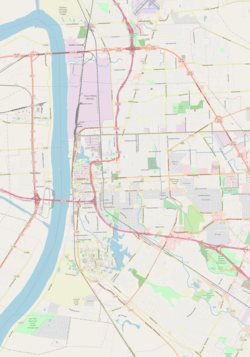Magnolia Cemetery (Baton Rouge, Louisiana)
Magnolia Cemetery | |
 Entrance to Magnolia Cemetery | |
| Location | 422 North 19th Street Baton Rouge, Louisiana |
|---|---|
| Coordinates | 30°27′04″N 91°10′03″W / 30.45101°N 91.16754°W |
| Area | 20 acres (8.1 ha) |
| Built | 1820s |
| NRHP reference No. | 85000161[1] |
| Added to NRHP | January 31, 1985 |
Magnolia Cemetery is a 10-acre (4.0 ha) cemetery in Baton Rouge, Louisiana.
Description
The cemetery is located at 422 North 19th Street and is bordered on the north by Main Street and on the south by Florida Boulevard.[2] The west and east sides are bordered by 19th Street and 22nd Street, respectively. The land for the cemetery was purchased by the town of Baton Rouge from John Christian Buhler, Jr, in August 1852, with burials in the area dating back to the 1820s according to some sources.[3][4] The cemetery was the site of intense fighting during the Battle of Baton Rouge on August 5, 1862;[5] a commemorative ceremony is held at the cemetery each August.[2] It was turned over to the city of Baton Rouge in 1947 and is now administered by the Recreation and Park Commission for the Parish of East Baton Rouge (BREC).[3][4]
Magnolia Cemetery was added to National Register of Historic Places on January 31, 1985.[1]
Notable burials
This cemetery was the main burial site for most prominent citizens of Baton Rouge, white and African-American, from 1820s to the 1970s and burials continue to the present. Among the more noteworthy persons buried here are 6th District Congressman Edward White Robertson (1823-1887) and his son Congressman Samuel Matthews Robertson (1852-1911), John Hill (1824-1910), 5th District Congressman William Brainerd Spencer (1835-1882), novelist Lyle Saxon (1891–1946), State Senator Douglas Cullum Montan (1834-1896), the Whig politician James M. Elam and his son James Essex Elam, four-time Mayor of Baton Rouge, former Register of State Lands Ellen Bryan Moore, and Cecil Morgan, the state representative who moved to impeach Huey Pierce Long, Jr.

See also
- Baton Rouge National Cemetery
- National Register of Historic Places listings in East Baton Rouge Parish, Louisiana
References
- ^ a b "National Register Information System". National Register of Historic Places. National Park Service. November 2, 2013.
- ^ a b "Magnolia Cemetery". Park and Recreation Commission for the Parish of East Baton Rouge. Retrieved 2009-05-23.
- ^ a b "Magnolia Cemetery" (PDF). State of Louisiana's Division of Historic Preservation. Retrieved May 10, 2018. with three photos and two maps
- ^ a b Dr. Arthur Bergeron and Division of Historic Preservation (October 1984). "National Register of Historic Places Inventory/Nomination Form: Magnolia Cemetery". National Park Service. Retrieved May 10, 2018. With six photos from 1984.
- ^ "Baton Rouge, Magnolia Cemetery, Civil War Louisiana". American Civil War. Retrieved 2009-05-23.
External links
- Cemeteries on the National Register of Historic Places in Louisiana
- Protected areas of East Baton Rouge Parish, Louisiana
- Louisiana in the American Civil War
- Tourist attractions in Baton Rouge, Louisiana
- Geography of Baton Rouge, Louisiana
- Buildings and structures in Baton Rouge, Louisiana
- National Register of Historic Places in Baton Rouge, Louisiana
- 1852 establishments in Louisiana




